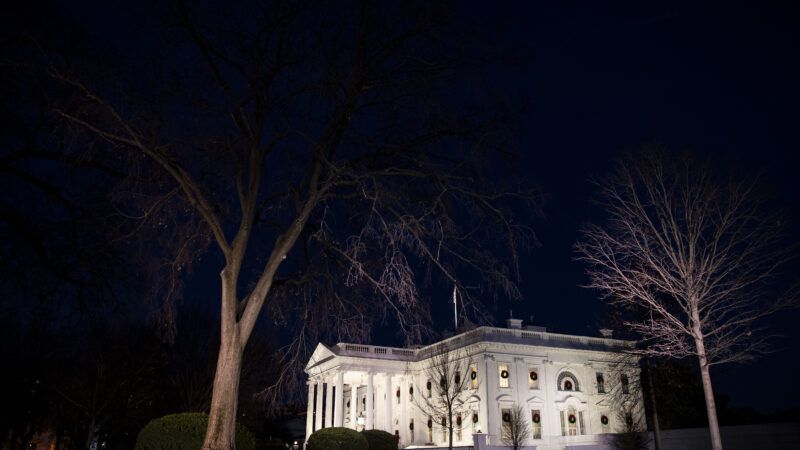Surrendering on COVID Spending Is a Predictable, Fitting End for Trump's Tenure
One of the underappreciated failures of the Trump presidency is his squandering of an incredibly rare opportunity to reset how Washington operates.

President Donald Trump's decision to sign on Sunday night a bill that averts a government shutdown and provides $900 billion in emergency spending for COVID-19 relief was a fitting end to his term in office—a predictable surrender that followed days of manufactured drama and bluster, ultimately changing nothing.
When the 5,000-page, $2.3 trillion bill landed on his desk a week ago, Trump objected to a variety of its provisions. In a video statement, he called the package "a disgrace" and demanded that Congress authorize larger stimulus checks for all Americans while cutting frivolous spending on foreign aid and the arts, among other things.
By then, it was probably too late for Trump to force Congress to make meaningful changes to the legislation. As a lame-duck president with a track record of not caring about policy specifics, he wasn't in a very strong position. But it wasn't too late to create unnecessary and meaningless drama, which is about the only thing the president has delivered consistently. Trump withheld his signature long enough to force some unemployment benefits to lapse and raise the prospect of a month-long government shutdown—one that would likely not have been resolved until President-elect Joe Biden takes the oath of office.
In the end, however, Trump signed the bill, sent a meaningless list of demands back to Congress, and nonsensically claimed victory—the equivalent of drawing a frowny face on the last page of the bill, right next to his own signature.
It's a pattern that has played on repeat for nearly four years now. Trump prides himself on being unpredictable—he "thrives" on chaos, or so he claims—but the reality-TV-star-turned-president's approach to governing is as formulaic as an episode of The Apprentice.
When Congress sent Trump a budget bill in March 2018 that annihilated previous spending caps and put the country on a trajectory toward larger deficits, Trump threatened to veto it—on the very day when he was expected to sign it.
Hours later, he backed down and inked the budget, but not without issuing a stern warning to Congress. "I will never sign another bill like this again," he promised. "I'm not going to do it again. Nobody read it. It's only hours old."
But when Congress sent Trump an even larger budget in 2019, he dutifully signed it.
Trump's pattern of bluster-and-surrender has played out elsewhere too. He promised a "good and easy to win" trade war against China that has proven to be neither of those things. It turned out to be disruptive, messy, and expensive—and the "deal" struck last year between the U.S. and China has been mostly ignored by both sides.
He came into office promising to blow up the North American Free Trade Agreement (NAFTA), then spent two years sowing chaos before eventually agreeing to a deal that was just a slightly updated version of the status quo.
While there are many reasons for libertarians to be disappointed with the past four years, one of the underappreciated failures is Trump's squandering of an incredibly rare opportunity to reset how Washington operates—particularly with regard to budget-making and spending.
Trump entered office without being beholden to any of the usual power structures that help someone get elected president, and he brought with him a powerful bully pulpit that he's never been afraid to use. A version of Trump who actually cared about making a difference could have used those things to shine a spotlight on the waste and cronyism that dominate federal spending.
He did that on occasion, of course, but never demonstrated any serious interest in setting policy or governing—he spent four years being distracted by whatever Democrats were saying about him on CNN and whether NFL players were kneeling before their games. He ranted and raved, and he approved one spending hike after another.
As Reason's Matt Welch has summarized, Trump's record on spending includes "a half-dozen continuing resolutions, plus a few longer-term omnibus deals, that together eliminated Obama-era spending caps, suspended the debt ceiling borrowing limit, and ratcheted up the size of government, all at the tail end of a historically long economic expansion and stock market bull run." Even if you exclude the epic amounts of money the government has spent in response to the pandemic, Trump increased federal spending by as much as President Barack Obama did—and in half the time.
Fittingly, then, Trump will exit office with almost no legacy other than an astonishing increase in government spending. Most of his regulatory reforms will be undone quickly by the incoming Biden administration. The major tax reform that passed under his watch was mostly the product of the very Republican establishment Trump has spent years demolishing. He hasn't brought the troops home. He hasn't built the wall.
Sunday's bill-signing is likely to be the last significant legislative act of Trump's presidency, and it is a fitting cap for a president who should be remembered mostly for speaking loudly and carrying a small veto pen.


Show Comments (119)